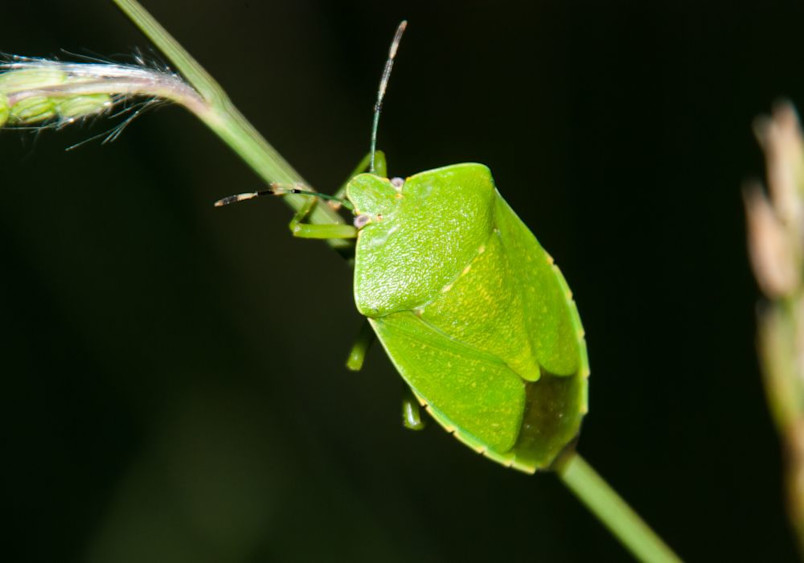
Stink bugs are a well-known nuisance, especially in the spring and fall seasons. They can be found not only outdoors, but also indoors, often in the attic or other dark, secluded spaces. Many curious, playful pets chase down and even try to eat bugs as they fly around or scurry along the ground.
What if your dog eats a stink bug? Are stink bugs poisonous? As pet owners, it is our responsibility to do our research and educate ourselves on what is and is not safe for our dogs to get into. Embrace is your partner in pawrenthood, acting as a resource for pet health information on many topics, so read on to find out more about stink bugs and dogs.
Are Stink Bugs Harmful?
There are many species of stink bugs, of which the brown marmorated stink bug is the most common, but they are all similar in appearance. They have a triangular exoskeleton body, a small head with antennas and 6 legs. They are an invasive species of insect named after the smelly odor they emit when scared or hurt. This odor is thought to be a deterrent to predators, making them less desirable to consume. Dogs, especially those with a high prey-drive, may be more likely to chase down and eat insects. Although stink bugs emit a smelly odor in an attempt to deter such an event, dogs are often unbothered by this and may even find the odor appealing or encouraging to taste.
You may wonder, What should I do if my dog ate a stink bug? Should you induce vomiting? Should you call the pet poison control hotline? Step one is: Don’t panic. The good news is, while annoying, stink bugs are not harmful or dangerous to dogs, cats, or humans, even when consumed.
Are Stink Bugs Toxic to Dogs? Do Stink Bugs Bite?
Stink bugs are not toxic to dogs, but it is best to prevent ingestion if possible. Stink bugs do not bite or sting and do not carry diseases, but they do emit a chemical responsible for their odor. This chemical can be highly irritating which can result in inflammation of the gums, tongue, and lips after contact possibly leading to drooling, discomfort or pawing at the mouth.
Additionally, watch for signs your dog might have an upset stomach. If swallowed, the chemical stink bugs secrete may cause gastrointestinal upset which often manifests as drooling, vomiting, or diarrhea. These symptoms are typically self- limiting and resolve within 24 hours.
If your pet happens to be allergic to stink bugs, on the other hand, ingestion can result in an allergic reaction which can become a true emergency. Watch your pet for the development of facial swelling, hives and labored breathing. If any of these occur, your pet should be taken to the vet immediately.
Pet Insurance for your Stink Bug Emergencies!
Consider getting pet insurance for peace of mind so that, in case of emergency, you are protected financially, and your pet’s health is protected, leading to better outcomes. If your dog experiences persistent gastrointestinal upset after eating a stink bug, such as vomiting or diarrhea for over 24-48 hours, you should bring them in to be seen by their veterinarian.
After a thorough physical exam, your vet may recommend diagnostics like bloodwork, X-rays, or an abdominal ultrasound to look into the reason why your pet is sick. Treatment will depend on the underlying issue and can vary from at-home medical management to intense hospitalization or even surgery.
Veterinary bills can add up quickly when your pet is sick. Having pet insurance empowers owners to opt for gold standard care without hesitation leading to better health outcomes for their fur babies.
Preventative Measures and Pet Safety
As mentioned, while nontoxic, it is best to prevent pet exposure to stink bugs to avoid the possible GI upset it can cause. As with anything pets shouldn’t be getting into, pet-proofing their environment is the best way to keep them safe. This may involve restricting access to certain areas of the house or keeping potentially harmful substances locked up.
In the case of stink bugs, the best way to protect your pet would be consulting a pest control company. Pest control companies can come out to your home and spray to keep bugs away. Always ensure they know you have pets and are using a pet-safe bug spray formula. Keeping doors and windows sealed can help reduce the number of insects getting into your home as well.

Can Dogs Eat Stink Bugs?
Stink bugs can seem unavoidable during certain times of the year, but fortunately there is no need to fret for your pet’s safety. This common pest is considered nontoxic, although it can cause mild GI upset or oral irritation post ingestion.
If your dog eats a stink bug, monitor them, but don’t panic. Now enjoy the upcoming spring season with your pup, but be sure to educate yourself in potential outdoor hazards. Ultimately, being aware of such details contributes to a safer and more carefree life with your dog, allowing you to cherish every playful moment together.